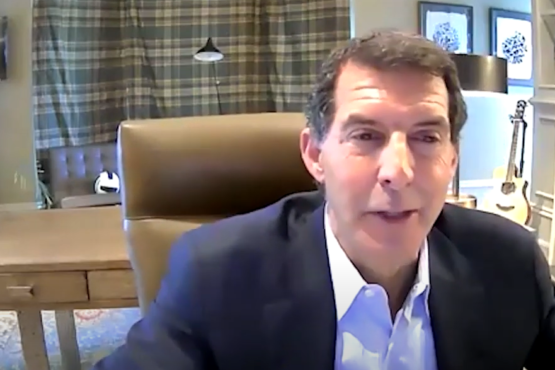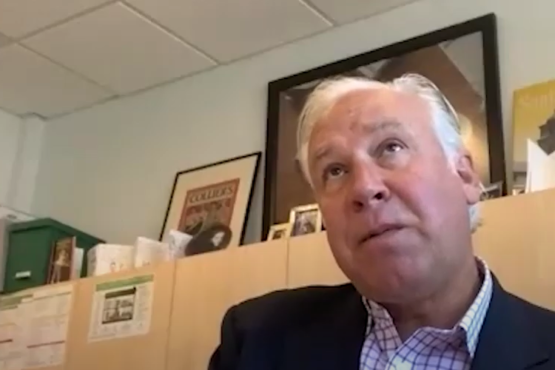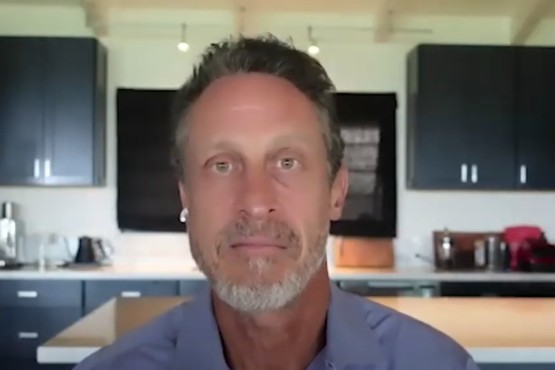Welcome to A Second Opinion podcast where we are rethinking American health. I’m your host Senator Bill Frist. To make sense of all the dynamic perspectives in healthcare, you need a trusted source engaging at the intersection of policy, medicine, and innovation. You need A Second Opinion, a podcast where it all comes together. I’m excited to be joined by Dr. Josh Umbehr, a Kansas based family practitioner whose direct primary care model is getting national attention. But before we get started, I want to thank our sponsors.
Bill Frist: A Second Opinion is powered by MEDHOST, a trusted EHR for healthcare facilities. We’re also brought to you by Waller Law, as a trusted advisor and partner to many of the leading companies in the highly regulated industry of healthcare, Waller has earned a reputation for creative insights and professional commitment. Now let’s turn to the episode. Dr. Josh Umbehr is the founder of Atlas MD, which he considers a blue collar concierge medical service that nearly any American can afford.
Bill Frist: For $50 a month, a patient can have unlimited access to a physician, including after hours, weekends and holidays. Can receive house calls if needed. Reach the medical team via phone, email, or text. And perhaps most interestingly, get access to wholesale labs and medications, often for pennies and pill, lower than Walmart, lower than Walgreens. In our conversation, Josh shares why the Atlas MD model is the future of primary care. And now please join me and our guest for a second opinion, Josh Umbehr.
Josh Umbehr: Yes sir.
Bill Frist: Thank you for being with us today.
Josh Umbehr: Thank you.
Bill Frist: You know we’re here to talk about one of the most innovative approaches I think to to health broadly, and healthcare delivery. And it really comes all the way back to simplicity, keeping things simple for the patient, most important in family and for the physician and the nurses, the people who are involved. And then keeping it high value. And we talk about fee for service and we talk about moving to value based care and all, but you’re talking about real value. So tell us Atlas… What is it? What does it do?
Josh Umbehr: Atlas is healthcare made simple. We are trying to create a model where we can make so much healthcare affordable that we just need less insurance. If we can bend or break that cost curve, it changes so much in the healthcare space. Now when people can get medicine for a penny a pill, they worry about their health less. It creates less of a financial burden, it incentivizes them to get more care because they’re not worried, they’re checking their cholesterol, or treating their cholesterol is going to break the bank.
Bill Frist: So to your average person not you and not me, not that we’re not average, but the average person, what’s on their mind? Is it the cost issue? Is it the quality issues? Getting in to see people, but again, you’re right on the front line, and you go right to sort of the lower cost opening and use up, but what’s really on their mind?
Josh Umbehr: I think it’s a lot of access and cost. I think patients judge quality in their own way. Do I like my doctor? Do I think they empathize with my need? More so than you know what school they came from, or what outside metric they’re hitting it. So then it’s, “will I be burdened by unpredictable care?” And I think there’s a nice analogy to cars. If you have a car that’s always breaking down, you’re just constantly in stress. “When will I be stuck on the highway again? When will I not make it to work for the third time and lose my job?”
Josh Umbehr: And then if you’re a mechanic, you just don’t worry about your car breaking down, because you can fix that, it costs a little bit of your time, but you understand it deeper and you’re less worried. So for the patient that is vulnerable to a healthcare need, and they hear these just crazy high prices, a 1000 or $2,000 for stitches in the ER, then they watch their kids and just worry, “Is today the day we lose all of our Christmas money on an accident where the kids fall down and go boom and get rushed away?”
Josh Umbehr: So they have this constantly in the back of their mind. And if we can show them that healthcare made simple, made affordable, made accessible. We joke that when you can text your doctor and he replies faster than family, that’s as good as it gets. So then now it just what became a headache now is seamless. I like two historical references, Columbus’s Egg and Napoleon’s Aluminum.
Bill Frist: Let’s hear them.
Josh Umbehr: So the theory was that Christopher Columbus, discovers new world comes back and they say, “Well, you’re not that amazing. If the world’s round, anybody could have done that.” So he takes an egg and he challenges all the King’s horses and all the King’s men to make it stand up on its own. And they all agree it’s impossible to make an egg stand on its own. Takes the egg crunches the bottom, and then it stands up. So what was perceived and agreed as impossible, now become so benignly simple, anyone can do it.
Josh Umbehr: We’ll put a pin in that. And Napoleon’s Aluminum was that aluminum was so rare that if you wanted it to impress dignitaries, the General Adolf Silver, he ate off gold, and they ate off aluminum. Fast forward and insert a new technology like electrolysis and now we have aluminum foil that we throw away. So not to make healthcare something we throw away, but to take a new idea like the egg and a new technology like the business model direct care, and make healthcare so accessible that everyone has access to very high quality, very high affordable care, that’s just easy and insurance still has it’s role for the catastrophic things of life, but the regular things now become, back of the mind type stuff.
Bill Frist: Yeah, forgettable. Almost forgettable.
Josh Umbehr: Almost forgettable. If the kid needs stitches, don’t worry, my doctor has them for free and that’s a level of peace of mind that most people don’t get. But for $10 a month you can. I mean sure not everybody has 10 extra bucks, but a lot of people can find that.
Bill Frist: Okay. Let me unpack a little bit of that, because I think you’re exactly right. I think if they can take this, the worry, all the anxiety is sort of out of the care model. All of a sudden you open up to value higher care, more compliance, and let’s come back eventually and talk about the patient and the provider, what the impact is. But let’s begin to unpack it by explaining what is direct care. When you use the words direct care, it means just a little bit something to whoever’s listening to it. So explain what you mean by direct care and how Atlas provides that.
Josh Umbehr: Direct care is the business model that says we feel medicine is best delivered as a membership, so it can be based on age, which is very simple, not on preexisting conditions and for a small fee like a gym membership, I can have access to all of these other things. I can have 20 different, you know, exercise equipment things, or I can have access to a doctor 24/7. Their personal cell phone number, their email. I have unlimited home visits, work visits, office visits, telemedicine visits that the direct care model has no copay, because we don’t want people to worry that there’s a fee every time they see us and continually providing value to the patient in ways that we haven’t done before.
Josh Umbehr: So any procedure we can do in the office is free because, the true cost of most of those things are a couple of bucks, sometimes less than that, or in EKG is 36 cents. So then we can absorb that cost and take that financial algorithm out of the patient’s mind, and then we can push into things that we haven’t normally done before, such as the wholesale meds and labs, that now I think the best way to show patients quality and empathy is to kind of show and tell. To be continually doing things that earn their trust, and being very transparent on meds in labs and saying, “I’ll for go profit because I want you to know if I’m prescribing you a medicine, is because I think you need it.”
Josh Umbehr: And they worry. “Was the doctor incentivized? Maybe they make money off the meds. They hear these kinds of things on the news, so they don’t really care about me. They’re just checking a box or patting their bottom line.” Then when they see that their cholesterol medicine is $3 and 65 cents per year. That really takes… even if I made $3 off of them, they wouldn’t mind because it’s now so ridiculous. Again, it’s aluminum foil.
Bill Frist: Yeah.
Josh Umbehr: Now they say, “Okay, well if the doc for goes all the additional potential profit on something like that, they must be looking out for me.” It’s $2 to check your cholesterol. They must really want me to do it.
Bill Frist: Okay, so explain how this is even possible. Because for a monthly payment then?
Josh Umbehr: Yes sir.
Bill Frist: That most people make. Give me an example of what a patient would pay.
Josh Umbehr: $50 a month for most adults.
Bill Frist: And is age related, always?
Josh Umbehr: Yep.
Bill Frist: Okay. So let’s say I’m the patient, I pay $50 a month. I may or may not have insurance, but does insurance play into the model directly in any way?
Josh Umbehr: Nope.
Bill Frist: All right. So that’s nice, because a big complicating factor, in our world today is it’s, you the doctor, me the patient, but between us comes a big insurance company that’s telling us that-
Josh Umbehr: And you take mine-
Bill Frist: And taking money off and all. Again it’s nice to move them to the side. We’ll come back to that, how is that possible for lots of things. So I pay $50 a month and that $50 a month goes to you or to Atlas, and then you the doctor… And how many doctors for example, work with you in Atlas?
Josh Umbehr: Our clinic in Wichita, Kansas, we have two locations and five docs. So in essence it goes to the clinic and then the clinic pays the doctor. But now the patient’s just a member of the clinic.They can get services at either side if they need to. But they have one doctor that’s assigned to them all the time.
Bill Frist: All right. And then that doctor is a family physician, or internist or primary care doctor?
Josh Umbehr: All of ours are board certified family physicians, four MDs and one DO.
Bill Frist: All right. So if I’m a patient and I need a physical exam that’s part of this $50 fee, and you listed a whole bunch of things, so I’ve got to figure out, “He can’t promise everything to every body overall. So there’s got to be some sort of restraint in there.” But if I had an appendicitis, I would come to you, or I might come to you first and then you’d make the diagnosis.
Josh Umbehr: Correct.
Bill Frist: And then make the appropriate referral.
Josh Umbehr: Exactly. We tell patients where your best first phone call outside of 911 for an emergency.
Bill Frist: And you’re on 24/7?
Josh Umbehr: Mm-hmm (affirmative).
Bill Frist: And do you use any telemedicine or telehealth at all, virtual care?
Josh Umbehr: Yep. They can call, text, email or video chat with us.
Bill Frist: Yeah. And then on the pricing and the examples you gave, if you talked to me about a cholesterol drug, I’m used to seeing, you know, $800 a year.
Josh Umbehr: Right.
Bill Frist: And it’s going up every year and then you’re talking about dollars. How does that work? How do you get it, and where does it come from?
Josh Umbehr: It’s really interesting that I think the system is incentivized to prescribe name brands, or it’s easier, faster, or the doctor spells it on the script, because they have no way of knowing what it costs. And I think the biggest myth is, well it’s $10 for generics and $20 for name brand, and we assume there’s a $10 difference.
Bill Frist: Right.
Josh Umbehr: And there could be a 100 or a $1000 difference for certain meds. We looked at one municipality in our area that they were spending $96,000 a year on name brand Crestor for cholesterol on 63 employees. We could have gotten the same amount of medicine, generic Crestor for three to 4,000 a year and basically saved them I think a 160 memberships a month for the year.
Bill Frist: Wow.
Josh Umbehr: So we could’ve helped that much on one thing, because we’re incentivized to know costs and to track value, and the FDA requires generics and name brands to be of the same potency. But even if they weren’t, if they were off by half, we can just double the dose and still not spend $96,000. But the docs aren’t aware of what those things cost. So that lack of knowledge, or we’re too busy to pay attention to those details just means we push costs downstream and are unaware of it.
Josh Umbehr: Now that we focus on six people a day and not 30 people a day, part of the service we’re selling to the patients is we’re your advocate to get you through the system. So the appendicitis, we say, “Well, let’s send you to the lab in the middle of town because we can get a stat read even quicker. It’s under $3 for the CRP to see if you’re, you know, starting an infection. Then if we need to, we can move to ultrasound or CT almost always same day if it’s before five or six o’clock.” And now the new study said 70% of appendicitis’s could be treated with antibiotics. So now it even minimizes their need for surgeons. But then when we need a surgeon, we know who to reach out to, who does great work, has good bedside manner and is affordable, so we’re helping them out at every step.
Josh Umbehr: I think when they have unlimited access to us, we don’t have the luxury of just wiping our hands and saying, follow up with the specialty or go to the ER. I don’t want to go to the ER and find out it was nothing and get a $3,000 bill. So well come in, let’s do a physical exam, let’s watch you for a few hours. If you’re not getting worse, maybe we get your labs at 7:00 AM and noon and just check, but because there’s no additional fee for that, we’re evaluating an appendicitis for under five bucks. You can’t do that anywhere and consistent continuity with your own doc.
Bill Frist: And a physician, your own doctor will have how many patients assigned to them or part of their network?
Josh Umbehr: We try to focus on about 600 patients per doctor.
Bill Frist: 600 patients.
Josh Umbehr: That ends up being a reasonable panel that the doc’s not too busy after hours or during the day, but it’s still a sustainable business model.
Bill Frist: And you’d see about how many patients over the course of the day?
Josh Umbehr: About 1% of our patient panels. So on average six a day.
Bill Frist: Yeah.
Josh Umbehr: But maybe for 30 or 60 minutes if that’s what they need.
Bill Frist: Yeah. So I understand the patient and the huge advantage is there, and they’re tapping into the knowledge where the physicians are incentivized to really know what the highest value. If it’s a pharmaceutical, if it’s an x-ray, if it’s a referral. On the physician side of that, how are they appropriately incentivized or what attracts them to this model and how are they compensated?
Josh Umbehr: All of our docs are salaried in our clinic. A lot of the direct care practice we help set up, do the same thing. They’re incentivized by taking great care of their patients because it’s small business. There’s not a major hospital chain that you can blame and administrative hurdles, et cetera. But they know that even if they have to work really hard on a patient who only pays 50 bucks, then there’s a lot of patients who don’t need their help at the same time, so they don’t have to worry about those types of things.
Josh Umbehr: So just do great care for the patient in front of them. But also if you can show the patient that you’re looking out for them and say, “Well maybe we just go right to the CT, because I don’t want to do the X-ray and the CT.” Or you know, ultrasound is nice but we’re running on the clock. It’s four o’clock in the evening. If we wait until after a CT in the ER is a lot of money, let’s jump to something a little bit more aggressive that’s only 180 bucks for a CT abdomen pelvis, which is a lot better than going to the ER.
Josh Umbehr: Or those kinds of things. So now, the doctors are continually communicating with the patient to show their thought process and why we’re doing what we’re doing to involve them in that. And I think that’s how they show their value.
Bill Frist: So what part of physicians do you attract? Are they people who like a fixed amount or a salary, which increasingly people are moving towards? Or are they like physicians who like to keep their independence, or are they physicians who just are just mission directed, and how challenging is it to get that sort of person to come with you as a physician?
Josh Umbehr: I think a lot of times we find physicians that are already doing concierge level care, direct care, they’re just in the wrong business model. They’re the one that the hospital is upset with because they’re seen 20 people a day instead of 30, because they keep spending a little too much time with the patient.
Josh Umbehr: So you’re already doing care. They’re already giving up their cell phone number because they’re very empathetic about their patients, and want them to feel connected but constrained by the system. So I think our best doctors are the ones that have that mindset, and are currently in the wrong insurance based model. So it’s a breath of fresh air to come out, make more than they were making. Still be able to focus on their patients, but know that it’s so affordable. Arguably they’re saving the patients money.
Bill Frist: Yeah.
Josh Umbehr: If you’re on Imitrex, that could be a 100 or $200 a month. At the pharmacy cash price we get for three to $5 there. They’re saving 150 bucks a month. Then they can be just very proud of what they’re doing and not feel like they’re at competition with the patient or the system. So then they’re just happier than physician.

Bill Frist: And now a thank you to the partners that made this podcast possible. A Second Opinion is sponsored by MEDHOST. For 35 years MEDHOST has been partnering with community hospitals and specialty healthcare facilities to focus on what matters most. Effectively, taking care of their patients. Trusted by over a thousand healthcare facilities, MEDHOST offers a full suite of healthcare IT and business solutions, including an EHR in emergency department information system. Healthcare providers need a partner who can help them meet patient needs with agility backed by world-class support. MEDHOST solutions are an ideal match for facilities wanting to enhance patient care. To learn more, go to medhost.Com.
Bill Frist: A Second Opinion is also brought to you by Waller Law. Partner with a healthcare law firm that’s the picture of help. As a premier healthcare law firm, Waller helps businesses across the US and abroad achieve their financial and strategic goals in a wide range of transactional regulatory and litigation matters. As a trusted advisor and partner to many leading companies in a highly regulated industry of healthcare, Waller has earned a reputation for creative insights and professional commitment. Waller was also recently recognized as one of the nation’s largest healthcare law firms on modern healthcare. Waller has the passion and experience to drive business and practice law. Visit Wallerlaw.com to learn more.
Bill Frist: And now back to the episode. And all the patients that you have, how many of them have insurance, or on Medicaid or Medicare for their other coverage coming in? And how many are uninsured or have no other access to a type of government or private insurance?
Josh Umbehr: I’d say about 20% of our patients have no insurance. Despite the affordable care act requiring it, we’re still just cheaper for them to take the penalty or go without it.
Bill Frist: Right.
Josh Umbehr: Which ironically gave them more money per month because of the high insurance premiums and for some being more than their mortgage. But then the rest are generally a high deductible type plan. Probably 15% of our patient panel’s Medicare, so they already have that as a default and maybe a backup, but Medicare pays for about two thirds of what the patient needs and we still have a lot of opportunity to show them savings. They get to choose their doctor. They don’t have to have seven minute visits. They have the most need, but the most desire to have a connection with a doctor that’s listening. So, I think they’re a population that is expecting more than they’re getting. So perfect for direct care to come up and prevail.
Bill Frist: A lot of people don’t realize Medicare only pays, you said two thirds. Somewhere between 63% and 70% of your true healthcare cost spending. And especially in the Medicare for all debate, people forget that it doesn’t cover dental, it doesn’t cover vision. There’s no limit on the out of pocket expenditures. It only covers about 60% of your total costs.
Josh Umbehr: They’ll come after you [crosstalk] gone.
Bill Frist: Yeah, exactly. So we have to be careful when people ask. Coming on… So insurance companies, how do they… again, I see this consumer patient and individual physician relationship. How do the insurance companies look at the relationship?
Josh Umbehr: It’s a little counterintuitive, but they ultimately really benefit here. At first the movement was so much concierge medicine, insurance is bad, we’re backing the system that they felt blamed and that was their preconception.
Bill Frist: Right.
Josh Umbehr: As they see this now being direct care, very transparent, very affordable, high value, low cost. They are saying, “Well you’re cheaper than the pharmacy. Why wouldn’t we use you?”
Bill Frist: Right.
Josh Umbehr: You’re providing it even cheaper than their copay. So now we don’t have an administrative burden on top of that. So our patients have no copay. They’re getting maximum amount of care. They’re going to the ER and urgent care less because they have you 24/7. You’re not trying to ask us for shared savings or shared risk. We’ve made it as simple as possible for all parties. Then this is like a true insurance product, car, home life where we’re only covering the big stuff and they’re okay covering the big stuff because it doesn’t happen very much and they’ve got stop loss for the rest.
Josh Umbehr: So they’re not being nickeled and dimed with all the other things. No one has come out to defend them and I think that’s why they were hesitant for the model. But I think we’re trying to show that, I would love to see health insurance premiums go down by at least half, but then we could insure everybody for the same or less amount. When all you want is the hospital coverage, all you need is hospital coverage. Or your appendectomy can be less than your deductible anyways, there’s not a specific reason it should be that expensive, and chemotherapy that we can make 99% less. Less than a Starbucks cup of coffee.
Josh Umbehr: And on that point you know, Starbucks spends more on healthcare for employees than they do on coffee beans for their product. Now we know we have a broken inflated system, but insurance has never dove into how they can really bend that cost curve, because they’re not the doctor, they’re not the pharmacy, they’re not the other types of providers. When we come in and force all those providers to bring the costs of the true cost of medicine, a penny a pill or what not, it’s the insurance company that benefits downstream. So we’d like to think it’s first the patient benefits, then the physicians, then the employer, then the insurance company, because we’ve managed their risks, it’s so much better ultimately public in terms of a more affordable Medicare, Medicaid type system, because that value just flows downstream.
Bill Frist: You know a lot of people when they hear concierge care, and there are lots of different kinds of concierge care, so you might explain to me sort of where the direct care Atlas model fits in the overall concierge care, but they look at it as adding cost. You know where people are paying on top of insurance and they’re running around and buying this additional coverage just for convenience. Explain that a little bit in terms of where Atlas fits in the concierge model.
Josh Umbehr: Sure. For simplicity, I think the concierge model is understood to be very high end. 25,000 per person per year, very much the 1% type thing. And often we’ll still bill your insurance for Medicare, and Medicaid or Medicare, because so many of those patients just wanted to know how does this work with my insurance, and the path of least resistance was we take it. But we’re still kind of stuck in that broken system. Like a lot of things, it starts on a very high end, but now you can get a brand new iPhone for 20 bucks a month, like technology and things improved that direct care is meant to be a very low monthly membership and no insurance.
Josh Umbehr: That really we’d like to see could cover if not everybody the vast majority of everybody, but I think through Medicare and Medicaid charity… If a church is spending $50 on a blood test, we get for a $1.50 their charity dollars go so many times further in this model.
Bill Frist: Win, win, win.
Josh Umbehr: Exactly. Very much so. Atlas is still considered Atlas and MD Concierge Family Practice, because when we started the direct care buzzword hadn’t gained any traction yet, and I always liked it because I wanted concierge family medicine to become redundant, where everyone just saw family medicine is such a high value that we could just drop the concierge part and I think we’re getting there, because now doctors are saying this isn’t a seven minute visit where I refer you off. This is a 30 minute visit where we talked about a ton of options. Play out a plan, you ask about the dog and the kids, remember your name and have a bond and then do your procedure for free and save a couple hundred bucks.
Bill Frist: And right now you have your practice and then other practices and then you give sort of consulting to people who are interested in the model in terms of size and scale and growth over time. Where are you along your curve?
Josh Umbehr: We’re not quite hockey stick, but we’re definitely on a solid up slope. We do all the consulting for free because we’re passionate about helping doctors move into this space when 70% of doctors are burnt out and we lose a doctor a day to suicide. I think we have to help our own profession here.
Bill Frist: Because you’re consulting to other doctors how they can adopt this model?
Josh Umbehr: Yep.
Bill Frist: For themselves.
Josh Umbehr: Give them the keys to the castle, by number turn key so that they can go out, and help their own patients, help themselves. and then what we’re seeing now is a few years ago we’d start one or two or three clinics a month. Now we’re routinely starting between 20 and 30 clinics a month, for the last four or five months and climbing.
Bill Frist: And geographically are they in your region or are they all over the country?
Josh Umbehr: They’re all over the country. I think that North Dakota might be the last holdout or South Dakota, so 48, 49 States. And as doctors just believe that this is a true sustainable model.
Bill Frist: Right.
Josh Umbehr: We’re painfully evidence-based. The old joke for docs never be the first or the last to prescribe something, but I think there’s always been a lot of doctors on the sidelines. Like, okay, well it’s bad. I know it’s getting worse, but I don’t want to jump ship just yet. I’ll let somebody else try. If they’re successful, then I’ll think about it. And so now as I see more and more success stories, they feel comfortable making the switch. But it’s interesting because it’s exportable and your first principles would say, all we really need is a patient and a provider. A nurse or doctor, mid-level somewhat. And we don’t need an insurance company.
Josh Umbehr: We don’t need all these complicated pieces despite cultural differences, it’s the same thing everywhere, where healthcare is hard to get and expensive and painful. But we’ve exported this model to Saudi Arabia, Sierra Leone, and I think that we’ve got some clinics trying to consider it in Nigeria. You know, some are volunteer clinics or whatnot, but it’s the same idea is-
Bill Frist: Truly scalable.
Josh Umbehr: Remove all the other pieces, what if we just provided, you know, good care at an affordable, sustainable way? So I think it’s very exciting to see doctors take ownership of how they help their patients.
Bill Frist: It really takes me back to what caused you to have this dream? Where did it come from? How early did it come? What was sort of the motivating thing? And Josh Umbehr’s sort of background that got this little fire started.
Josh Umbehr: So growing up my dad was a trash man. He’s a lawyer now. So of course I still tell people he’s a trash man. But from as young as I can remember, we were working on the trash truck and of course as a boy you just love it. You know, break stuff and be dirty and-
Bill Frist: Noise.
Josh Umbehr: Yeah.
Bill Frist: Dramatic and crushing.
Josh Umbehr: Yes, it’s very [inaudible] good childhood. But he would make a point of saying you can work with your back for living, or you can work with your mind, especially on those hot August, Kansas days. He’s point to people working in doors. You can do either one of these. And so, you know, ultimately he’s done the same thing being a successful lawyer. But that ability to buck the system and just kind of see past some stuff and watching him run a great business for 20 years and we finally sold it to a national firm. They lost it in three because they didn’t have the passion, the customer service, the connection.
Josh Umbehr: As we got into healthcare, it was really the wise fool from the emperor’s new clothes. Why are we doing this? Where’s the bill? Where’s just the… Here’s the price and here’s the payment. why is it that way? But I think growing up and watching a very simple but well run business is just like becoming a mechanic when you’re five. You just… No engines and you hear it, knock, you know something’s wrong and can probably diagnose it. So that experience led us just to say this doesn’t work and let’s explore things that could be working and seek out doctors who were doing it differently and what are they doing well and what are they not doing well, and how can we combine the best ofs.
Bill Frist: And that your biggest challenge and and further growth is what? Because it is disruptive to a major sense, because people think of healthcare delivery now. They come back to insurance, insurance, insurance and further and further away from a direct relationship of a patient with a doctor or a nurse or a provider. What’s the biggest challenge as you look to the future?
Josh Umbehr: I hope it’s viewed as creative destruction. We want to take it as far as we can bend it and break it. The hardest part is just educating. And really more educating doctors. Patients understand it much easier. They hear a a better product. A better price. Peter Thiel was quoted saying… Someone asked can you predict what will change? And he said, “No, we could have never predicted an Airbnb or an Uber, but what we can predict is what won’t change.” You know, people will always want a better product, at a better price, better service, and faster, easier.
Josh Umbehr: Now looking back, yes, you can plug that into all these unicorn type things, and it makes perfect sense. So I think that’s where we’re coming in healthcare where the patient just hears, “Yes, these are all the things that I don’t like about the system. Where do I sign?” They’re not limited to HIPAA or CMS contracts or just the minutia that bugs doctors down. Explaining that to the doctor that, “Yes, you can do this.” “No, no. I’ve tried to make the egg stand up.” “No, let’s just crush it.” “But, they’re going to pay me? “Well, they already pay you a copay.” “But how do I get meds?” “The same way you get meds now actually, you just do more of it.” “Oh, I do order flu shots and injectables for migraines and lighter cane. So I just kind of keep doing that?”
Josh Umbehr: I mean, it sounds so simple that they’re looking for where’s the other shoe going to drop? I don’t want to be duped, I’ve seen other doctors make bad business decisions. You support some weird product or whatnot. And so they’re just afraid of being outside of the herd.
Bill Frist: And are you optimistic? As you look to the future from where you sit and how you’ve built a great company. It’s built around simplicity and affordability and high quality and especially high value. Are you optimistic in terms of the future?
Josh Umbehr: I think Pandora’s box of affordable care has been opened. The current system’s not getting any better. People want more care, more often. They are at maximum frustration with costs and convenience. And that gets worse every year. On some level, the bars on the floor here, we only have to be a little bit good to impress patients, which is sad. But when we do, I think there’s such an overwhelming support from the patients, the physicians say, well, Dr. Thomas White, who was the former state chapter president for the American Academy of Family Physicians in North Carolina, retired out of frustration, got bored, came back to practice because of the direct care model and said this, “For the first time in 25 years, I feel like I’m practicing medicine the right way.”
Bill Frist: Fantastic.
Josh Umbehr: And that that was the moment for us that we’re like, “Okay, this is working and makes sense from a doctor’s experience.” All kinds of things that a career is kind of independently validating and judging this and it’s working for him and his patients. And he still is, 34 years later, he’s still practicing. So that’s-
Bill Frist: That’s a pretty… That’s an optimistic but pretty good data. Moving in the right direction.
Josh Umbehr: That’s [crosstalk 00:33:57].
Bill Frist: Well Josh, thank you for being with us again. It moves our overall healthcare sector right, where we want it. And that is affordable access and good care in the simplest possible way, to make it a forgettable experience instead of the chaotic experience it is today.
Josh Umbehr: Absolutely.
Bill Frist: Thank you very much for being with us.
Josh Umbehr: Thank you.
Bill Frist: Thank you. This episode of A Second Opinion was produced by Todd Schlosser, the Motus creative group team and Snapshot Interactive. You can subscribe to A Second Opinion on Apple podcast or wherever you are listening right now. And be sure to rate and review A Second Opinion so we can continue to bring you great content. You can get more information about this show, its guest and sponsors at secondopinionpodcast.com. Thank you again to our sponsors, MEDHOST and Waller Law ,and be sure to join us for our next episode. A Second Opinion broadcasts from Nashville, Tennessee. The nation Silicon Valley of health services, where we engage at the intersection of policy, medicine and innovation.
